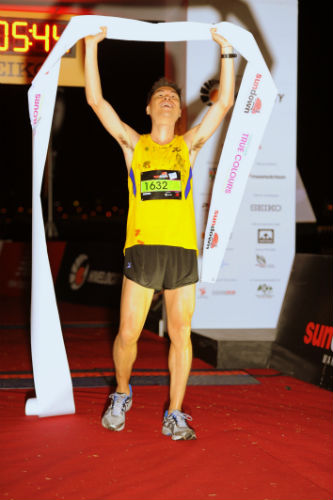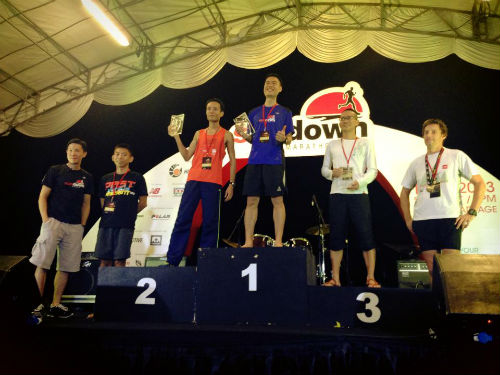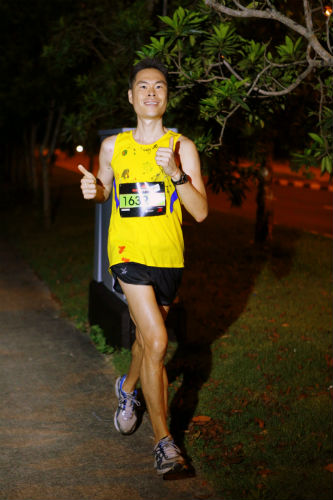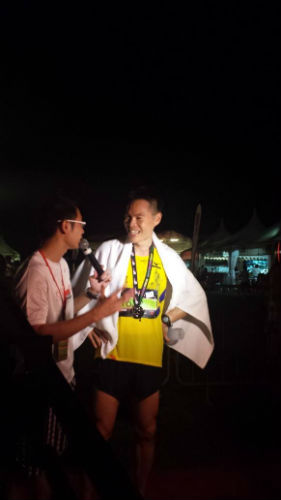He took part in the gruelling 100km Sundown Ultra Marathon earlier this month – and emerged champion, with a stunning time of 9hours 5minutes 34seconds – to break the previous record.
Prior to Sundown 2013, Wong has taken part in two other 100km races – the Sundown Ultra Marathon 2011 and the North Face 100 Singapore 2011. So he is no spring chicken when it comes to ultra distance running.
I spoke to this newly crowned ultra marathon champion, 33-year-old Wong Hoong Wei, to find out the secrets behind his success – and also got some useful tips from him about distance running.
Read on, to see how this Education Officer at the Ministry of Education Headquarters, broke the Sundown 100km Ultra Marathon record this year.
Hoong Wei, why did you initially take up running?
I have always been enthusiastic about sports since I was a kid. In my teenage years through to my undergraduate days, my passion was playing basketball. In 2010, I was sidelined by an injury to my left leg, which required surgery. During the recovery phase, I occasionally jogged to rehabilitate the leg and found the exercise to be particularly suited for people like me with busy lifestyles as it could be done at my own pace and time. I also realized that I enjoyed the time spent by myself as it gave me time to reflect and rejuvenate. As the mileage got longer, I came to enjoy the ‘runners-high’ that comes after the completion of a long run.
Did you expect to stand a chance of winning the 2013 Sundown Ultra marathon?
I did not expect to win the race at all as there were many faster, more experienced and well-trained athletes. There were little expectations due to the unpredictability in a race this long. Even the most experienced can be plagued by unforseen physiological or environmental issues.
What is your big secret to achieving such a great timing and completely smashing the previous record of 9hours 12mintes 53seconds?
There is no ‘big secret’. I just focused a lot on conditioning my body with consistent training, resting well and eating well. The result is extremely satisfying as I achieved what I personally believed was possible for my fitness level. The record was an unexpected bonus.
What was the most challenging part of your 100km journey?
At the 75 km mark, two of us were trailing the third place lead bike and maintaining a comfortable pace. The other runner then surged after the pit-stop, taking the bike quickly out of my view. I was completely demoralised as fatigue was setting in and it looked like I was falling behind quickly. Being alone meant that I could not feed off the pace of the bike and fellow runner, and so I began to focus on my own pain. I pushed harder and reminded myself that there were still about two hours of running and so I stood a chance to catch up.
How did you train for the race?
There was no specific training period for the ultra. As my interest in running increased and I began to see physiological improvements as a result, I naturally progressed to run more and more. Every day, six days a week, I woke up at about 5 am to run before work, mostly medium to medium long runs at an easy pace with at least one long run. In the weeks approaching the ultra, I made it a point to do back to back long runs at the goal pace and increased my weekly mileage.
How do you cope with the aching muscles, fatigue and tiredness during a long race such as the Sundown Ultra?
Physically, when I feel the onset of a muscle cramp, I drop the pace slightly hoping that the altered pace will allow me to use different muscle groups more. Mentally, I employ strategies to help me focus on other things instead of the pain, such as following the pace of fellow runners, checking the execution of the race plan with regards to pace and nutrition, splitting the race mentally into sections and focusing on reaching the next hydration station. I also fill myself with positive thoughts, such as how it would feel to finish the race strong, about friends and family cheering me on, and about all the hard training I have done that has prepared me for this.
How did you manage to fight your sleepiness in a night race such as Sundown?
I did not feel sleepy during the Sundown run as the adrenaline of the race kept me going. Besides, there were enough other ‘distractors’ for me to not focus on sleeping, such as managing the pain, checking my pace, and of course the beautiful scenery of Changi, East Coast Park, and Gardens by the Bay at night!
How did you adjust your diet and energy intake requirements, in order to prepare for the Sundown race?
During weeks of increased mileage, I increased my calorie intake and included more carbohydrate rich foods. I did not follow a fixed diet, but preferred soups as they were easier to stomach and provided the protein, minerals and hydration essential for recovery. I also ate a lot of fresh fruits and vegetables.
What is the difference between training for a full marathon and an ultra-marathon?
Both involve lots of running. A longer race would inevitably require more running, but that to me would be the main difference. When increasing mileage, do so gradually, consider reducing the pace of the runs to avoid over-use injuries, and eat foods with high nutritional value to help the immune system recover. Races that are a lot longer than the marathon might require runners to eat solid food on the go, so getting comfortable with energy gels, bars or other forms of nutrition might become part of the training. Chaffing, abrasion wounds as a result of long periods of friction between gear and skin, is another factor to take preventive measures against. Experiment with lubricants and materials during your long runs to see what works for you. Other considerations include the environment and terrain of the ultra-marathon. For example, it would be good to do more running on trails if the ultra-marathon you are attempting is off-road or hilly.
Roughly how much running would you recommend a person to do, before they tackle their first ultra-marathon?
Weekly mileage and distance of your longest training run are two important factors in the preparation for an ultra-marathon. However, it is impossible to pin-point a minimum standard, as everyone starts with a different fitness level and each one has different objectives. Someone once said that the longer you’ve been running, the more chance you have of completing an ultra-marathon. Based on my personal experience, I would advise someone to continue with regular marathon training, but gradually increase the time spent
on your feet during the weekly long runs to match the time projected to complete the ultra. For example, if the distance would likely take me 15 hours to finish, I might want to incorporate a six to seven hour session, which need not be continuous running and may involve breaks or brisk walking.
One of the ways to figure out a training plan is to find someone of a similar fitness level who has completed an ultra and learn from their experience. There are also plenty of resources online with regards to completing your first ultra-marathon. I have learnt a lot through the reading materials I find on the Internet.
How do you juggle your work and family life with your strict training regime for the Sundown Ultra Marathon?
My training plans are very flexible, and I fit in runs according to how much time I have. With a bit of prior planning, I am able to incorporate runs during my commutes between home and work or between appointments. Having a supportive family has also been critical as family plans are made with training and racing in mind. With regards to time management, I try to be disciplined enough to cut out things in my schedule that do not match my main priorities.
What are some tips for long distance and ultra-marathon running that you can share with readers?
First you have to enjoy it. Learn to appreciate the solitude and time for reflection. Enjoy the company you’re with as well, as running is a perfect opportunity to get to know people better. Secondly, choose a distance that allows you to maintain a consistent and regular running routine. Improving running fitness takes patience and no one session can reap more benefits than a sustained period of regular training.





Congrats on a great race! I love ultra marathons